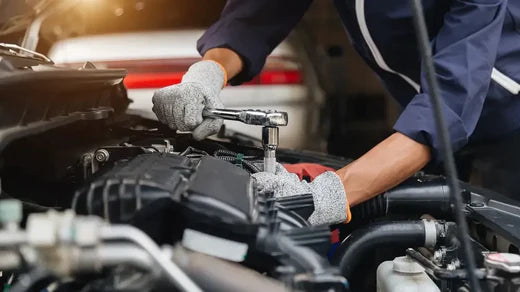
The Distinction Between Delete Kits for EGR, DEF, and DPF
EGR and DPF deletes are two of the most well-liked performance improvements for diesel engines. Although removing exhaust components from your car may seem counter-intuitive, getting a deletion done has many advantages.
Deletes are aftermarket kits that take off factory-installed parts from diesel engines that limit their performance and fuel efficiency. EGR delete kits, DPF delete kits, and DEF delete kits are the most popular delete kits.
Do you want to improve the efficiency and performance of your diesel engine? Then, check out how these three well-liked kits differ from one another in terms of diesel deletes.
What is a Diesel Delete?
Diesel exhaust is famously filthy and oily, and with time, the EGR (exhaust gas recirculation) valve, EGR sensors, EGR cooler, and DPF will become clogged (diesel particulate filter). Performance and fuel efficiency will suffer when these components clog up, necessitating cleaning or replacement of these emissions-related elements. Instead, some diesel owners choose to "remove" these pollution-controlling parts.
A diesel deletion entails removing the DEF system, the catalytic converter, and the DPF, then replacing the exhaust with a new one. A tuner will also be required to reconfigure the ECU (engine control unit) of the car. The OEM (original equipment manufacturer) software that regulates fuel flow and engine timing will be swapped out for a fresh program by this tuner.
Additionally, the tuner will recalibrate the onboard diagnostic system (OBD) to accurately track engine operating parameters and guarantee that no emissions-related problems appear as a result of the missing components.
The soot-clogging concerns are resolved once a diesel deletion is finished. Additionally, performance enhancements such as an increase in torque or horsepower or better fuel efficiency may be possible. The engine hardware, the aftermarket software, and the tuner may all affect these favorable improvements.
When it comes to doing a diesel delete, there are three different sorts of kits available: DPF, DEF, and EGR. Owners of diesel vehicles frequently use these services for their engines.

DPF Delete
A diesel engine's DPF (diesel particulate filter) is a device that helps clear the engine of soot. Then, a canister with honeycomb-shaped compartments is used to store the soot.
As soon as these honeycomb parts become blocked, the exhaust becomes constrained and begins what is referred to as a "regen cycle." Diesel fuel is utilized during this cycle to burn up the soot and force it out of your exhaust system all at once.
Repairing your DPF may be fairly expensive if it sustains damage. Additionally, removing the particulate matter might impact the performance, fuel efficiency, and engine life of your car. A current DPF system will eventually produce low fuel economy. The fuel economy might increase by up to 30% after removal.
Increased performance and power are a top priority for diesel truck owners because many of them use their vehicles for towing or hauling hefty cargo. For this reason, a lot of diesel truck owners decide to have their DPFs deleted.
EGR Delete
The exhaust emissions from your diesel car are decreased via the EGR (exhaust gas recirculation) system. To cut down on nitrogen oxide exhaust emissions, a valve that is electronically controlled allows a small quantity of vehicle exhaust to mingle with the air intake stream.
While it minimizes the quantity of exhaust that is released into the atmosphere, it also causes your engine to produce more soot, which lowers performance and fuel efficiency. EGR systems can also lead to pricey problems like broken parts in engines. Additionally, it may result in other difficulties like coolant troubles, damaged engine parts, leaking cylinders, and sticky valves.
Bypassing the system with an EGR delete, your diesel car will run cooler, have a longer engine life, and perform better overall.
Things to Take into Account Before a Diesel Delete
Although a DPF, DEF, and EGR delete will increase your diesel vehicle's performance and prolong the engine's life, there are a few things to think about first:
- Warranties: The warranty on your engine may be void if pollution-control parts are altered or removed. Before deleting anything, check the warranty conditions for your car.
- Restoring Components: If you decide to repair the pollution-control parts of your truck for any reason, you may expect to pay a hefty sum of money to have it done.
- Legalities: DEF deletes are forbidden in various Canadian provinces. Before making these kinds of adjustments, check your province's legislation.
DPF delete kits are not prohibited in Alberta, but all heavy vehicles must have an OEM-quality exhaust system in order to pass annual CVIP inspections.
Is a Diesel Delete Right for You?
A diesel delete might be the answer if you drive a diesel car and want to prevent engine problems while enhancing performance.
Deleting a diesel engine is not a weekend DIY project. These deletes should be carried out by a group of qualified specialists to ensure they are done correctly and will have the most impact on your vehicle.
At Park Muffler, our staff has a wealth of knowledge on exhaust systems and deletes. We can guarantee that the deletion on your diesel car is appropriately performed and that all connected systems are calibrated. We can also advise you on which kits will have the biggest effects on your diesel engine and exhaust system.
